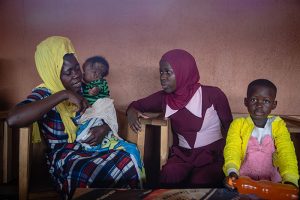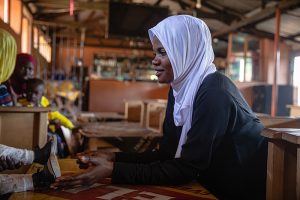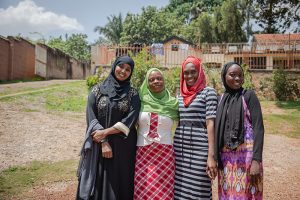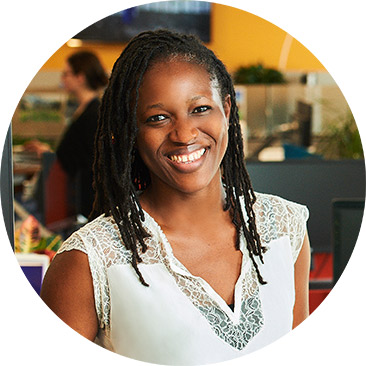Last year, an activist leading one of the organizations that we support died by suicide. Staff at a grantee partner organization survived a rape. Some men wanted to teach them a lesson about militating for women’s rights. A young woman working for a grantee partner organization narrowly escaped an attempt on her life after she resisted family pressure to marry someone who could provide financial stability. Space for political advocacy for civil society is closing in some of our focus countries, with at least one activist partner being imprisoned and new laws that undermine girls’ and women’s rights. This occurred as the COVID-19 pandemic continues to undermine years of progress towards building a more equal world.
Despite these setbacks, our grantee partners remain relentless in their pursuit. At the end of our pilot year and after funding, connecting, and mentoring 150 grassroots organizations in six countries, we garnered three key lessons that will be critical to ending child marriage:
- We must aim beyond delaying the age of marriage. The path to ending child marriage is through challenging traditional gender norms and practices. Interventions that only seek to increase access to basic services for adolescent girls while ignoring power and gender dynamics will reinforce the status quo and fall short of creating a world where women can live their best lives.
- It takes a village. In communities where one’s body belongs to the community and not to a single individual, supporting girls’ leadership and building their power requires both strengthening their confidence and building a community of allies to support them. We must beware of projecting traditional western norms and notions of leadership as we support our partners. And this requires…
- Following the lead of grassroots actors. They know their contexts best. They know their communities best. They are more strategically positioned to enact long lasting change. They need to be resourced and supported to accelerate progress.
Ending child marriage will take time, commitment, and flexibility. We are starting to see small changes in our partner communities. We are planning to stay the course to accelerate the domino effect, that will eventually lead to a life where girls can be girls, and marriage is not the default option for every woman.
Today, I am using my voice to hold in the light a few grassroots partners who are doing groundbreaking work to end child marriage. Some of them are ones you won’t easily find. They don’t have flashy websites or annual fundraising campaigns. These are lean organizations putting everything on the line to change the status quo in their communities:
- Muslim Teen Mothers Upraising Against Forced Early Marriages (MUTMUA) is an organization in Uganda led by young women in their early 20s who have survived child marriage. They utilize a collaborative approach in which they engage religious and traditional leaders, men, and boys to consider how child marriage and discrimination against girls and women is harmful to their community. Many young women and girls participating in the organization’s programming are formally married or are girls at-risk of child marriage who have run away from their communities and settled in a low-income neighborhood in the capital city of Uganda with no safeguards or social protection. These girls and young women are now becoming activists in their community – speaking out against the patriarchal norms that have negatively impacted them. Through their work, an additional 24 religious leaders and influencers have decided to work alongside them as supporters of their campaign against child marriage.



- Association for Advocacy and Legal Initiatives Trust (AALI) is a women-led organization operating in India. It’s strategic focus on girls and young women brings a unique expertise in legal casework to the portfolio. The organization promotes choice and freedom for girls and young women and trains young women to become influencers and leaders in their communities, providing them skills to apply case management services to individuals seeking support in cases of child marriage and violence against women and girls. AALI is a well-established organization and shares its legal expertise with other partners in the portfolio. Recently, the organization successfully trained a new cohort of young women from the community to act as community caseworkers. These caseworkers are providing much-needed leadership and direct support to families impacted by child marriage and violence and that are experiencing compounding challenges because of COVID-19.
- Centre Pour la Protection de la Jeune Fille de Kabalo (CPJKA-Kabalo) is a young women-led, community-based organization working in the Democratic Republic of the Congo. Members of CPJKA-Kabalo’s community experience active conflict, internal displacement, and gender-based violence (GBV). Utilizing an open and inclusive approach, the organization runs a community center which supports girls and young women with economic empowerment opportunities, literacy classes, information about their rights, Sexual and Reproductive Health and Rights resources, and leadership skills. All groups of girls – including those that are traditionally excluded and/or are internally displaced – are included in the project activities, thereby promoting peacebuilding. As a result of recent training, several girls and young women have gained basic reading and numeracy skills and will progress to building basic financial management and vocational skills, increasing their economic independence and providing an alternative to early marriage.
- Caminante Proyecto Educativo (Caminante) is a women-led community-based organization (CBO) that works to prevent child trafficking and sexual exploitation in Boca Chica, the closest beach town to the capital of Santo Domingo. The organization supports young girls who are migrating from Haiti for sex tourism, in particular young mothers and pregnant teenage girls. Recently, it has created a network of young mothers with the aim of strengthening their leadership and life skills to help them achieve better opportunities. It also facilitates a radio program led by girls that works to address issues of teenage pregnancy; child marriage and early unions; sexual exploitation; and other topics of interest for the Boca Chica community. Recognizing the key role parents play in family decision-making, the organization provides training on communication skills to parents and provides information about how to be more supportive of their daughters that are young mothers or are pregnant.
The Girls First Fund is honored to work with these incredible organizations on the journey to end child marriage. Please reach out to us if you want to learn more about the above partners or if you are interested in supporting them.

